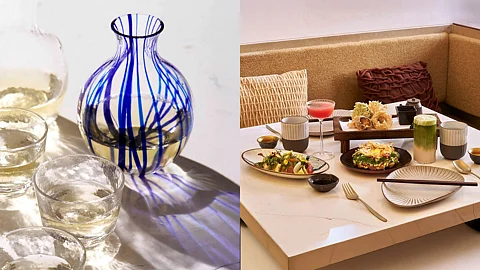
- HOMEGROWN WORLD
- #HGCREATORS
- #HGEXPLORE
- #HGVOICES
- #HGSHOP
- CAREERS
- ABOUT US
- CONTACT US

Within India's ever-evolving contemporary culinary landscape, Otoki — a new Japanese restaurant in Colaba — positions itself as a design-led, ingredients-focused, craft-driven izakaya-style restaurant. Opened in May 2025, Otoki offers an izakaya-style kozara or small-plates menu with an emphasis on technique and authenticity. Its arrival reflects a noticeable, deepening cultural interest in Japanese culinary traditions and techniques in Indian metropoles such as Mumbai, Delhi, and Bengaluru.
Located in a quieter lane off the Colaba Causeway, Otoki occupies a modest, thoughtfully designed space that previously housed its predecessor, the Indigo Deli. The interior avoids excess, drawing on traditional Japanese design cues — muted tones, wood-panelled surfaces, and clean architectural lines. An open kitchen and a sushi counter sit at the heart of the dining room, allowing guests a clear view of the preparation process. With a seating capacity of around 50, the restaurant is intimate but not cramped, ideal for both casual and business lunches and dinners.
The menu — led by by chef Mohit Singh, who has previously worked with 3-Michelin-starred Kikunoi Honten in Kyoto, Japan — emphasises on seasonal and sustainably-sourced ingredients while staying authentic to the spirit of classic Japanese kozara or small plates such as sushi, sashimi, ramen, yakitori, and tempura. The Tama-Negi salad, savoury Okonomiyaki pancakes and Chicken Nanban, Edamame with handmade Japanese Plum Salt, the Katsuo Tataki, and a selection of freshly prepared Nigiri and Sashimi are some of Otoki's signatures.
The beverage menu at Otoki is also an integral part of the Otoki experience. Otoki offers a curated selection of premium saké — fermented and distilled Japanese rice beverage ranging from Sparkling to Dessert. The bartenders also craft intricate cocktails using seasonal ingredients. Otoki also has a selection of Japanese whisky, beer, and fine wines.
Otoki's arrival reflects a larger shift in Indian food culture. Over the past decade, Japanese cuisine has gained increasing visibility in major cities like Mumbai, Delhi, and Bangalore. Initially popularised through sushi, ramen, and teppanyaki at luxury hotels and restaurants, Japanese food is now being explored more seriously by a younger demographic that seeks authenticity over novelty. This demand has given rise to ramen-focused cafés, omakase counters, and izakaya-style restaurants that mostly operate independently.
Part of this cultural shift is driven by global exposure — via travel, streaming platforms, and social media — but it's also tied to an evolving palate. Urban Indian diners are increasingly interested in subtlety, freshness, and clean flavours. Japanese food, with its emphasis on seasonality and technique, offers a counterpoint to the often rich, layered cuisines of India. For many, it's not just about trying something new; it's about embracing a different way of eating.
